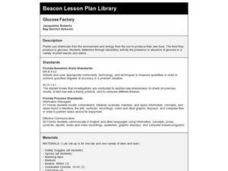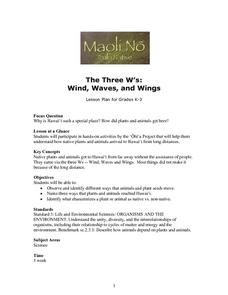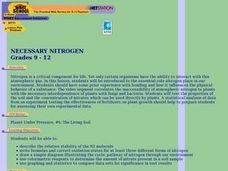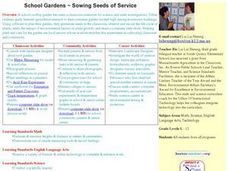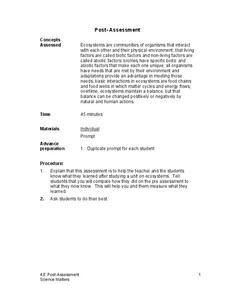Curated OER
People-Growing and Changing
Second graders study how people grow and change. In this health lesson, 2nd graders describe how they have changed over the years and guess who each student is after looking at everyone's baby pictures.
Curated OER
From Corn To Tortillas
Students investigate the food known as the tortilla. They research the growth cycle of the corn plant and how tortillas are made from it. The importance of the tortilla according to the Hispanic culture is explained to the students. The...
Curated OER
Glucose Factory
Fourth graders determine, through laboratory activity, the presence or absence of glucose in a variety of plant leaves and stems. They work in groups and perform a three part laboratory which shows them how plants convert sunlighht to food.
Curated OER
The Three W's: Wind, Waves, and Wings
Students participate in hands-on acticities to understand how native plants and animals arrived on Hawaii from long distances without the assistance of man. They then identify what characterizes a plant or animal as native vs. non-native.
Curated OER
Hopi Agriculture
Students discuss the farming practices of the past and present of the Hopi people and discuss the importance of corn. In this Hopi agriculture lesson plan, students also plant their own seeds of corn.
Curated OER
Food Web Chasey
Students work together to review the concepts of food webs and food chains. They describe the role of plants and animals when dealing with the cycling of energy. They identify any behavioural strategies to help the animals survive.
Curated OER
Signs of the Seasons
Students closely observe the natural world, record data, and notice patterns as the seasons unfold, they build a deeper understanding of seasonal change! The definition of phonology is the focus of this activity and how it changes...
Curated OER
Necessary Nitrogen
High schoolers view a video that presents the biogeochemical cycle of nitrogen. They compare types of soils and consider how different fertilizers affect soil composition.
Curated OER
Flower Power
Pupils investigate and explain the basic needs and life processes of plants. Key concepts include: living things change as they grow and need food, water, and air to survive. The reverse of the Kansas quarter serves as inspiration.
Curated OER
Pond Exploration
Students take a hands-on approach to explore the world beneath the water in this activity. They examine the creatures they catch to study about the adaptations these animals have that allow them to survive in this harsh environment. They...
Curated OER
Helping plants grow well
Students explore the effect of water, temperature and light on plant growth. Students are asked if they remember the LAW for plants. This is Light, Air(temperature) and Water, which all plants need for growth. Students are divided...
Curated OER
Sowing Seeds of Service
Third graders use metric measuring for model and actual plan in designing a roof garden. They photograph the process, record results in a journal, and plant seedlings in small containers. Finally, 3rd graders complete an acid rain...
Curated OER
Helping Plants Grow Well
Students explain the effect of water, temperature and light on plant growth.
Curated OER
Seed Germination
Students germinate a Mung Bean seed. In this seed activity students conduct an experiment germinating a Mung Bean. They apply three different treatments to the seeds: dry, moist, and underwater incubation.
Curated OER
How Does Your Garden Grow?
Students create a design for a school garden. In this garden design lesson plan, students analyze what plants grow best in their school's climate and work in teams to design a garden. Students measure the existing space, determine the...
Curated OER
The Pumpkin: An Outstanding Teaching Tool
Capitalize on the availability of this seasonal squash by designing a lesson for a variety of disciplines.
Science Matters
Ecosystem Pre-Assessment
Test scholars' knowledge of ecosystems with a 20-question pre-assessment. Assessment challenges learners to answer multiple choice questions, read diagrams, and complete charts.
Science Matters
Post-Assessment
Twenty questions make up an assessment designed to test super scientists' knowledge of ecosystems. Scholars answer multiple-choice and short-answer questions about organisms, food chains, energy flow, and more.
Science Matters
Energy Flow
Budding scientists work collaboratively to reenact energy flow in a food chain. Scholars take on roles such as producer and consumer and perform tasks that symbolize energy flow in order to provide evidence of how much energy passes...
Curated OER
Population Growth
Students grow duckweed, observe what happens when an organism population is allowed to grow without predation or competition, view videos about invasive species, and develop a proposal for controlling the growth of an invasive species in...
Curated OER
Contrasting Landscapes - UBC Farm Field Trip
Students visit the UBC Farm. In this lesson on various landscapes, students spend a day at the University of British Columbia exploring the farm and trail adjoining the campus. This lesson could be modified for use in any region that has...
Curated OER
Organic and Inorganic Waste
Students conduct a scientific investigation about organic or inorganic waste. For this organic or inorganic waste lesson, students create a compost heap to determine the difference between inorganic and organic waste. Students record...
California Academy of Science
Composting: A Scientific Investigation: California Academy of Sciences
Garbage, recycle, compost: Does it really matter where we put our trash once we are done? By making detailed observations over seven weeks, kids will see which materials break down naturally to become a healthy part of the soil, and...
Virginia Department of Education
Cell Division
Searching for simple ways to teach mitosis to high schoolers? Using colored chalk and onion root tips, pupils visually demonstrate what they view when looking through the lens of a microscope. There are also various ways to expand the...
Other popular searches
- Life Cycle Desert Plants
- Life Cycle of Plants
- Plant Animal Life Cycles
- Plant Lifecycle
- Life Cycles of Plants
- Flowering Plants Life Cycle
- Plants Life Cycle
- Life Cycles Flowering Plants
- Plant, Animal Life Cycles
- Science Life Cycle of a Plant
- Life Cycle of Florida Plants
- The Life Cycle of a Plant




